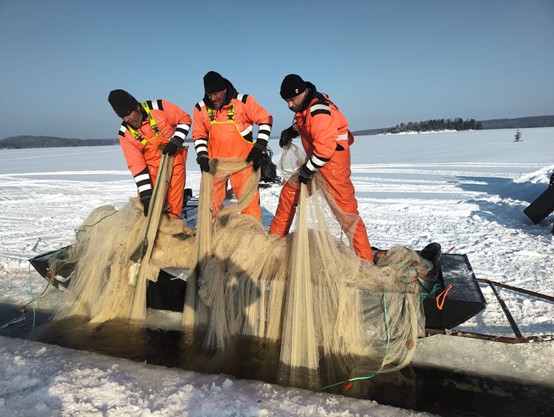
‘Business as usual’ has downsides. When nature gets damaged beyond repair, entire ecosystems collapse. The tragedy of commons is no longer a hypothetical to prevent, but a reality we need to accept. Or change!
Our new study published by the Journal of Management Studies begins where Nobel-prize winning theories end. We discover how organizations can begin to reverse degenerative dynamics.
Follow us to Finland, fondly known as the land of a thousand lakes. Most of its 187,888 lakes larger than 5 acres (500 square meters/ 5482 square feet) had been so polluted by effluent from large-scale agriculture and pulp and paper in the mid-1990s that the balance between fish species changed. Small prey species that thrived on the algae bloom which fed these pollutants exploded. Commercially valued predators, salmon and trout, became so low they were declared endangered. As pollution increased and predators decreased, fishers got caught up in this spiral of degeneration. Without fish the markets valued, and without markets for the fish, the entire occupation was at risk.
We were told that “fishers are now the endangered species”. While often blamed for the depletion of stocks elsewhere, in Finland, fishers had no culpability. Species imbalances were not of their doing. The undoing, however, was in their nets!
Gone fishing!
Finnish fishers took us on their boats and sleds, on their lakes in all seasons and invited us in their homes and communities so we could learn how they turned degeneration around, to set-off regenerative dynamics instead. Fishers did not do everything by themselves, of course. There were many helpers and marketers that spun this story. But without the fishers, there might be no story to tell.
Fishy business?
More than 1,000 lakes in Finland owe their renewed purity to biocentric work. We call this work biocentric because it centers on nature.
Little fish literally ate the pollution, serving as a natural water filtration system. This was the most cost-effective way, we were told, to reverse the legacy of the pulp and paper industry and large-scale agriculture. Turning pollution into healthy protein, rich in vitamin D and omega oils, was a big deal. If only we could eat the fish, and have them too!
Fishers knew where the fish gathered, so they could catch them, locally and sustainably. Catching the fish made room for more fish, which ate more algae, which reduced pollution further. But mother nature needed a helping hand to get this going. Three, to be precise.
The 1-2-3 of regeneration
First, fishers biomanipulated the lake. Not only because they could, but because they should. They took painstaking attention, and good advice from many other occupations and professions, to home in to those species that purified the water, until they got the balance of species just right to undo the pollution. We call this cycle material abduction, to emphasize the many concrete interventions required to iteratively figure out precisely which species to catch, when, and where.
To keep this good work going, someone had to eat the little fish. At first, nobody would.
Second, consumers needed a reason to dine on cheap, healthy and climate-friendly protein: why not choose the little fish who cleaned their drinking water? A lot of clever people figured out how to get consumers to lend a hand. We refer to this cycle as discoursive grounding, because Mother nature featured on the labels, from blue fish silhouettes to lake contours. Some stories even borrowed fishers’ bodies on picturesque background. Fishers spread their love for the lakes by embedding others in those aspects they cherished most. Some referred to the lake as “their soul”; the place their mind and body rest; the first tradition to pass on to their children. The sole intention of these bioaffiliation practices was to get consumers to love nature as much as fishers do.
Third, getting pollutants out of the lake, one delicious dinner at a time, required all manner of infrastructure, from innovations in fishing gear to regenerative supply chains. This part did not require any fishing at all. Just getting the little water-cleaning fish all the way to the dining tables of city dwellers. We call this cycle relational intercession because these helpers make a lot of wishes come true. Better gear. Bigger processing facilities. More funds. Many credit much of the creativity, collaboration and innovation to the chains of connections set in motion by the helpers. Often fishers went to them first, then returned repeatedly for more help as they tried to scale their operations, make their products more circular, join forces in cooperatives, or even attract new and next generation fishers to revitalize their communities.
The catch?
Regenerating degenerated commons took the proverbial village. Fishers started with material abduction, helpers with relational intercession, and marketers with discoursive grounding.
Copy, then paste!
There was some copy and paste. Well, a lot more copy than paste. Everyone who succeeded was keen to share and everyone else was keen to learn. Pasting, however, took patience. Learning was slow because cycles of material abduction worked at the pace of nature: it took spawning seasons to literally watching fish grow. Helping was slow because many forms had to be filled, then funders convinced. Marketing was slow because consumption habits were hard to change.
At COP-15, the United Nations’ Secretary-General reminded us that nature is humanity’s best friend. It’s about time organizations return the favor.
Any ecosystem imperiled by economic exploitation can benefit from biocentric work. Collapse not required!
The regeneration recipes we found on Finland’s inland lakes can be copied to your favorite ecosystem. The pasting, however, is up to you.

0 Comments